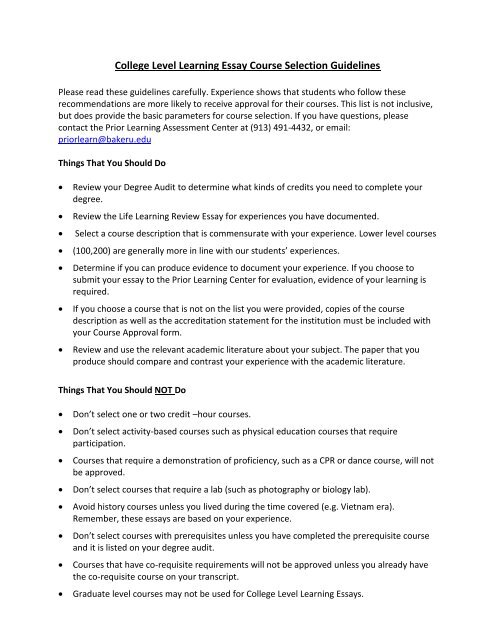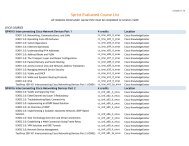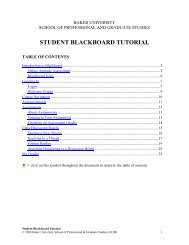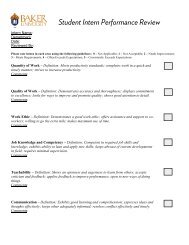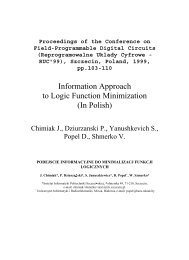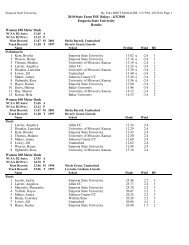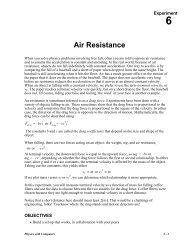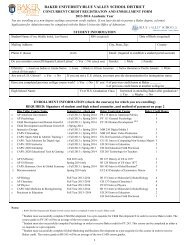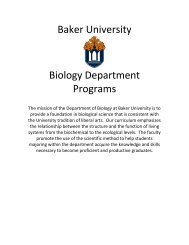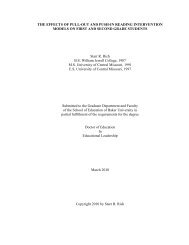College Level Learning Essay Course Selection ... - Baker University
College Level Learning Essay Course Selection ... - Baker University
College Level Learning Essay Course Selection ... - Baker University
Create successful ePaper yourself
Turn your PDF publications into a flip-book with our unique Google optimized e-Paper software.
<strong>College</strong> <strong>Level</strong> <strong>Learning</strong> <strong>Essay</strong> <strong>Course</strong> <strong>Selection</strong> GuidelinesPlease read these guidelines carefully. Experience shows that students who follow theserecommendations are more likely to receive approval for their courses. This list is not inclusive,but does provide the basic parameters for course selection. If you have questions, pleasecontact the Prior <strong>Learning</strong> Assessment Center at (913) 491-4432, or email:priorlearn@bakeru.eduThings That You Should DoReview your Degree Audit to determine what kinds of credits you need to complete yourdegree.Review the Life <strong>Learning</strong> Review <strong>Essay</strong> for experiences you have documented.Select a course description that is commensurate with your experience. Lower level courses(100,200) are generally more in line with our students’ experiences.Determine if you can produce evidence to document your experience. If you choose tosubmit your essay to the Prior <strong>Learning</strong> Center for evaluation, evidence of your learning isrequired.If you choose a course that is not on the list you were provided, copies of the coursedescription as well as the accreditation statement for the institution must be included withyour <strong>Course</strong> Approval form.Review and use the relevant academic literature about your subject. The paper that youproduce should compare and contrast your experience with the academic literature.Things That You Should NOT DoDon’t select one or two credit –hour courses.Don’t select activity-based courses such as physical education courses that requireparticipation.<strong>Course</strong>s that require a demonstration of proficiency, such as a CPR or dance course, will notbe approved.Don’t select courses that require a lab (such as photography or biology lab).Avoid history courses unless you lived during the time covered (e.g. Vietnam era).Remember, these essays are based on your experience.Don’t select courses with prerequisites unless you have completed the prerequisite courseand it is listed on your degree audit.<strong>Course</strong>s that have co-requisite requirements will not be approved unless you already havethe co-requisite course on your transcript.Graduate level courses may not be used for <strong>College</strong> <strong>Level</strong> <strong>Learning</strong> <strong>Essay</strong>s.
Technical or vocational courses may not be used for <strong>College</strong> <strong>Level</strong> <strong>Learning</strong> <strong>Essay</strong>s. (e.g.automotive repair, electricity, heating and cooling)Don’t choose engineering or agricultural courses. Remember, <strong>Baker</strong> <strong>University</strong> is a liberalarts institution. We don’t have degree programs in these areas; therefore, we don’t havefaculty with the credentials to evaluate such courses.<strong>College</strong> <strong>Level</strong> <strong>Learning</strong> <strong>Essay</strong> <strong>Course</strong> DescriptionsNote: This is not a list of “approved” courses. It is simply a list from which you may choosecourses to be submitted to the Prior <strong>Learning</strong> Assessment Center for approval as <strong>College</strong> <strong>Level</strong><strong>Learning</strong> <strong>Essay</strong> topics. Your instructor will assist you in selecting courses that are appropriatefor experiential learning essays.Arts and HumanitiesDesign 2D (ART 124)Johnson County Community <strong>College</strong>This is an introductory study of the principles of visual perception, two-dimensional spaceorganization and the visual elements of line, shape, texture and space. Concepts, materials andprocesses necessary to an understanding of two-dimensional form are explored usingtraditional and digital tools and techniques. (3 credits) (art)Design Fundamentals (ART X 479.6A)UCLA ExtensionA hands-on introduction to the creative process and core elements of graphic design for avariety of outputs including print and electronic media. Topics include research, typography,imagery, and concept development. Projects are progressive and critiqued. (3 credits) (art)Fundamentals of Photography (PHOT 121)Johnson County Community <strong>College</strong>This course provides an introduction to the tools, procedures, concepts and application ofphotographic imaging. Students will use cameras, light meters and darkroom equipment forfilm developing and printing to make images to meet the requirements of a series ofassignments designed to develop specific skills, competencies and points of view and tostimulate the students' creative capacities for personal expression, communication and selfunderstanding.(3 credits) (art)Digital Photography (PHOT 128)Johnson County Community <strong>College</strong>This course is an introduction to the concepts, tools and technology of digital imaging forphotographers. Students will develop competence in the use of digital photographicequipment, software, storage devices and printers to produce digital photographic imagessatisfying the requirements of a series of assignments designed to develop specific skills andcompetencies. Students will "capture," import, adjust, correct, transmit, store and outputimages. They will use digital imaging technology to produce photographs for visualcommunication and artistic expression. Ethics and cultural implications of the technology willbe discussed. (3 credits ) (art)Revised 4.10.13 2
Ethics (PHIL 143)Johnson County Community <strong>College</strong>This course provides a systematic and critical study of values related to human conduct. Itfocuses on both traditional standards of ethical conduct and qualities of personal character.What we hold to be right or wrong, the basis for believing so, and what we consider to bevirtues or vices are examined with an eye to understanding our current ethical situation. (3credits) (philosophy)Fundamentals of Music (MUSI 100-001)George Mason <strong>University</strong>This course serves as an introduction into the technical and theoretical aspects of music.Students will gain an understanding of musical notation (pitches and rhythms) anddevelop these basics into a more complex understanding of form and structure. Thiscourse is designed for students who have no previous musical training. The semester willcover several key topics: music notation, simple and complex rhythms, basic keyboardskills, major and minor modes, intervals, chords, and form. Students will establish avocabulary to discuss classical and popular music from a technical and aestheticstandpoint. (3 credits) (music)African American Religious Experience (RELIG 334)Iowa State <strong>University</strong>This course provides an in-depth look at sources and themes in African-American religiosity,assessing historical epochs of development, ongoing cultural themes and contributions of Blackreligion in the Americas. (3 credits) (religion)Religion in America (RELIG 210)Iowa State <strong>University</strong>Introductory study of the major beliefs, practices, and institutions of American Judaism,Catholicism, Protestantism, and Islam with emphasis on the diversity of religion in America, andattention to issues of gender, race, and class. (3 credits) (religion)Interpersonal Communication (SPD 120)Johnson County Community <strong>College</strong>This course focuses on the principles of effective speech communication in small group andone-to-one relationships. Theory and practice of interpersonal communication are studied andapplied to a variety of life situations. The course focuses on perception, self-concept, listening,conflict, language, nonverbal communication and culture as they relate to interpersonalrelationships. (3 credits) (speech communication)Fundamentals of Public Speaking (COMM 1010)Austin Peay State <strong>University</strong>This course is designed to enhance the development of public speaking skills. It is theapplication of public speaking principles and techniques for delivering public speeches withemphasis on presentation of informative and persuasive speeches; incorporates theidentification of the speech communication process with the effective use of outlining, researchto support topics, visual aids to enhance oral presentation, audience analysis for adaptationand techniques for overcoming communication apprehension. (3 credits) (speechcommunication)Revised 4.10.13 3
Small Group Communication (COM 230)Arizona State <strong>University</strong>Principles and processes of small group communication, attitudes, and skills for effectiveparticipation and leadership in small groups, small group problem solving, and decision making.(3 credits) (speech communication)Social ScienceDeath and Dying (SO 205)Passaic County Community <strong>College</strong>This course provides students with the biological, sociological, and psychological perspectives ofdeath, dying and bereavement in our society and around the world. Topics include euthanasia,suicide, terminal illness, funeral and burial rituals, and culture and ethical values and problemsrelated to death and the terminal illness in contemporary society. (3 credits)Drugs and Society (SOS 304)Thomas Edison State <strong>College</strong>Examines the physiological, psychological and sociological impact of substance use and abuseon individuals and on society. Includes current approaches to treatment and prevention ofsubstance abuse as well as pertinent legal and ethical issues. (3 credits)Introduction to Child Development (PSYC 250)<strong>University</strong> of North CarolinaThis class provides an introduction to the fundamentals of children’s physical, cognitive, social,and emotional development, from the prenatal period through adolescence. We will use ascientific framework to guide our study of how children develop. Students are expected toacquire a basic understanding of how factors within the child, family, and broader society shapethe process of development, and we will focus in detail on several key issues facing children inour society today. (3 credits)Introduction to Family Studies (SOC 120)<strong>University</strong> of Northern ColoradoThis course surveys central topics and related research in the sociology of family and examinesfamilies as an evolving social institution. Topics include historical and cultural variations infamilies, mate selection, cohabitation, marriage, parenting, divorce, remarriage, and stepparenting.(3 credits)Marriage and the Family (HSH 353)Arkansas Baptist <strong>College</strong>This course examines the significance of relationships, marriage and family and the role ofthese relationships across the adult life span. The course learning will begin with theexploration and history of family and marriage the ever changing definition. This course seeksto help the student understand the impact of relationships, marriage and family and how it maydiffer based on cultural, financial, lifestyle, and other factors (3 credits)Military Sociology (SO 330)*Norwich <strong>University</strong>This course provides a sociological perspective of the military as both an institutionand as an occupation. It examines the social structure and functions of the military and theRevised 4.10.13 4
social factors that influence behavior in and of the military. In terms of function, it examines thechanging purposes of the military in view of changing national and international conditions; andin terms of structure, it examines the norms, values, traditions, organizations, and culture ofthe military. It is designed to provide greater insight into the routine life within the military andinto contemporary issues confronting the military. (3 credits) *Syllabus not availablePerspectives on Aging (SOC 152)Johnson County Community <strong>College</strong>Social aspects of aging will be identified. Areas of special interest will include research themesand demographic trends; aging and its relationship to family, the economy, politics, religion andeducation; and the effect of cultural values on behavior and future of the elderly. (3 credits)Psychology of Adjustment (PSYCH 131)Bloomsburg <strong>University</strong>This course addresses psychological approaches to understanding, managing, and changing ourphysical and emotional well-being. Relationships with others, our environment(s), andourselves will be explored and examined. You will learn ways of applying psychologicalprinciples and concepts to enhance coping with common issues of adult life including variousproblems of living. Lecture, class discussions, group activities, experiential exercises,videotapes, and homework assignments will be used to meet the instructional goals. (3 credits)ScienceHuman Nutrition (BI 245)<strong>Baker</strong> <strong>University</strong> SPGSThis course provides an introduction to the fundamentals of human nutrition as related togrowth, development, and maintenance of good health. In addition to nutritional theory,students learn to analyze and plan nutritional regimes.Pharmacology and Medical Aspects of Drugs (ADS 163)Diablo Valley CCThis course provides an in-depth look at physiological effects and medical consequences ofalcohol and other drugs. How drugs are metabolized, their effects on body systems andbehavior, the addictive process, and current research are covered.ElectivesAdministrative Office Procedures (POFT 1309)Austin Community <strong>College</strong>Study of current office procedures including the work environment, workplace technologies,written communication, customer service, and career planning. (3 credits)Business and Professional Speech (SPD 128)Johnson County Community <strong>College</strong>Students will improve their verbal communication skills both formally and informally bystudying interviewing techniques, making effective presentations, working in groups,negotiating, studying listening techniques, and recognizing verbal and nonverbal messages. TheRevised 4.10.13 5
course is designed for the student presently working in business or planning to pursue abusiness degree. (3 credits)Coaching Baseball (ATHC 1730)Western Nebraska Community <strong>College</strong>A course designed for the prospective baseball coach. This course will cover a wide range ofmaterial from basic fundamentals to team strategy. This course will encompass skillprogression, conditioning, strategies, psychological and organizational aspects of the game. (3credits)Consumer Behavior (MKT 202)Johnson County Community <strong>College</strong>Upon successful completion of this course, the student will be able to analyze how consumersmake buying decisions in the marketplace and how various personal, group and situationalinfluences affect these decisions. In addition, the student will be able to demonstrate how thebasic principles of consumer behavior can be applied to develop competitive marketingstrategies that better identify and satisfy consumer needs and wants. (3 credits)Creative Retail Selling (MKT 134)Johnson County Community <strong>College</strong>Upon successful completion of this course, the student should be able to describe the processof successful selling in the retail environment. In addition, the student should be able to identifythe steps of selling and identify their appropriate application. The student should also applyselling principles through role-playing. Students who have received credit for MKT 133(Salesmanship) may not receive credit for MKT 134. (3 credits)Customer Service (MKT 2420)Pellissippi State Community <strong>College</strong>A practical course designed to prepare students to meet and exceed customers' expectations.The course focuses on communication, including listening, electronic, verbal, nonverbal, andtelephone communication skills and communicating in difficult and diverse customer situations.Techniques for learning involve simulations, observation research and an individual skillbuildingproject. (3 credits)Elements of Distribution (IT 230)Purdue <strong>University</strong>A study of types and systems of industrial distribution. Emphasis is on in-plant shipping andreceiving functions; modes of distribution; functions of, and services provided by, distributors.Consideration also is given to the nature of career opportunities. (3 credits)Entrepreneurship & Small Business Management (BMT 120-01) WOR-WIC Community <strong>College</strong>This course covers the planning for, starting and managing of a small business. Studentsevaluate the options for entering into a small business and the pros and cons of the forms ofownership. Topics include financing the small business, the use of accounting as a managementtool, legal constraints of interest to small businesses and the development of realisticmarketing plans. Unique issues of family businesses and work life/family life balance areincluded. (3 credits)Revised 4.10.13 6
Fundamentals of Accounting (BU 260)<strong>Baker</strong> <strong>University</strong> SPGSAn introductory accounting course describing accounting theory and practice, this courseemphasizes the use of financial statements for management control. (3 credits)Fundamentals of Basketball (HHP 108)<strong>University</strong> of MontanaHHP 108 is an introduction to the sport of basketball. Students will be introduced to the simplerules of the game, the necessary equipment, the basic shooting mechanics, and strategies.Students will also be learning the enjoyment of playing basketball through one on ones, smallFundamentals of Tennis (HHP 154)<strong>University</strong> of MontanaHHP 154 is an introduction to the sport of Tennis, the sport of kings. Students will beintroduced to the basic rules and scoring of the game, the necessary equipment, the basicstroke mechanics, on‐court etiquette, and game strategies of singles and doubles. (3 credits)Hospitality Human Resource Management (HMGT 207) Johnson County Community <strong>College</strong>This course will examine hospitality human resources management from the global perspectiveas the rise of multinational hospitality corporations and a multicultural society place newrequirements on managers with human resource responsibilities. Special emphasis will beplaced on both the "soft skills" involved in counseling, interpersonal relations and differentmanagement theories, as well as the "hard skills" involved in the legislative aspects of managingpeople. This course will concentrate on how to manage managers. (3 credits)Hospitality Law (HMGT 130)Johnson County Community <strong>College</strong>This course offers an overview of product and dram shop liability as well as of the various areasof federal and state legislation that regulate the hospitality industry. Emphasis will be onfamiliarizing the hospitality manager with ways to avoid costly and time-consuming lawsuits. Amanager's or owner's legal rights and responsibilities also will be discussed. Upon successfulcompletion of this course, the student should be able to recognize potential legal problems.(3 credits)Introduction to Exercise Physiology (HPER 208)Johnson County Community <strong>College</strong>Introduces the effects of exercise on the muscular system, the cardiovascular system and themetabolic system. The course will prepare the student in the design and principles for anindividual exercise program. (3 credits)Introduction to Financial Advising (BUSG 1304)Austin Community <strong>College</strong>A study of the financial problems encountered in managing family financial affairs. Topicsinclude financial security for the family, budgeting, use of credit, home ownership, financialtangles, and savings and investment plans. (3 credits)Introduction to Project Management (BS 340)<strong>Baker</strong> <strong>University</strong> SPGSThis course provides basic skills needed to successfully plan and complete projects in businessand public environments. Essential aspects of scheduling, cost estimation, purchasing, andRevised 4.10.13 7
monitoring quality are covered. Special attention is given to interaction between the projectmanager and the project team. (3 credits)Lean Manufacturing Principles & Practices (MFS 503)<strong>University</strong> of KentuckyIntroduction of the fundamental concepts for production utilizing lean manufacturing principlesand practices. This course will consist of lectures, manufacturing simulation laboratory, planttours, design projects, and assigned problems drawn from industry. (3 credits) *Syllabus notavailableOrganizational <strong>Learning</strong> for Lean Manufacturing (MFS 525)<strong>University</strong> of Kentucky<strong>Learning</strong> organizations are skilled at creating, acquiring, and transferring knowledge, and atmodifying their behavior to reflect the new knowledge and insights. In this context, this coursewill discuss leadership styles, adult learning principles, communication, organizationalbehaviors, and a structure for learning. (3 credits) *Syllabus not availablePersonal Investing (ECON 212)<strong>University</strong> of New MexicoIn this course I offer you an introduction to investing within the context of a lifelong personalfinancial strategy. Because this is an economics course, you will learn about markets, and byunderstanding simple market theory you will learn to make wiser financial decisions includingwhen, and how, to invest for special purchases, education and retirement. You will see howeconomic analysis makes you a better investor. (3 credits)Principles of Public Relations (JOUR 130)Johnson County Community <strong>College</strong>This course is intended to provide the student with an overview of the history, principles andreal life functions of public relations. The ability to work with the public is essential in business,education, health care and numerous other fields. This course is designed to give students thebackground to develop their PR skills. (3 credits)Principles of Supervision (BUS 140)Johnson County Community <strong>College</strong>Upon successful completion of this course, the student should be able to define thesupervisor's role within a company and identify the skills necessary to successfully fulfill thatrole. In addition, the student should be able to determine the supervisor's role in supervisingemployees on an individual basis and as a group. The student should also be able to apply theprinciples of supervision in simulated work situations. (3 credits)Production & Operations Management (BUS 335)Peru State <strong>College</strong>This course explores a wide variety of production and operations management topics. Topicsconsidered include: operations strategy and competitiveness, product design, process selection,quality management, capacity management, Just-in-Time (JIT) production systems, facilitylocation and layout, supply chain management, operations scheduling, and the productionplanning process. (3 credits)Revised 4.10.13 8
Professional Selling (MKT 134)Johnson County Community <strong>College</strong>Upon successful completion of this course, the student should be able to describe the processof successful selling. In addition, the student should be able to define the steps of selling andidentify appropriate application. The student should also be able to apply selling principlesthrough role-play. (3 credits)Project Planning and Control (X471.9)<strong>University</strong> of California (Berkley)This course provides an overview of advanced concepts and techniques associated with projectmanagement. You explore in greater detail the tools and techniques presented in ProjectManagement X470. It covers developing the plan from the initial idea through stakeholderanalysis, the conceptual phase, and the final, completed project plan. It also covers theimplementation stages, controlling and managing costs, management information systems,project performance, and evaluation. (3 credits)Restaurant Management (HRTM 011)San Jose State <strong>University</strong>Overview of food and beverage with emphasis on food quality. This course will focus oncontrolling food and beverage costs, production planning and service standards with anemphasis on food safety and managing a profitable operation. (3 credits)Retail Management (MKT 121)Johnson County Community <strong>College</strong>Upon successful completion of this course, the student should be able to describe and analyzeretail store organization and operation including customer markets, store location and design,human resource management, merchandise planning and control, and retail promotion. (3credits)Technology & Human Communication (COMM4544)<strong>University</strong> of Northern IowaThis course is an examination of the legal, political, ethical, democratic, hyper-commercial, andsocial implications of digital technology. You will learn about the Internet as a positive, socialnetworked sphere with a thriving creative commons, but you will also begin to see the dark sideof our hyper-connected world: a digital culture plagued with questions about copyright,government and corporate controls, and issues about privacy and unethical digitalcitizenship. You will also begin to consider how a life increasingly connected to digital tools isaffecting our daily lives. (3 credits)Teleservice Communications Skills (MKT 140)Johnson County Community <strong>College</strong>Upon successful completion of this course, the student should be able to describe the processof successful communication in the teleservice field. In addition, the student should be able todefine the principles of telescient service and identify their appropriate application. Thestudent should also be able to demonstrate effective communication and client services skillsthrough role- playing. (3 credits)Women in Management (BSAD 115)<strong>University</strong> of Texas - DallasIn this course we will examine the history of women in management, the key issues facingwomen managers today, and the outlook for the future. We will explore a variety of topicsRevised 4.10.13 9
including the concept of the glass ceiling, workplace diversity, legal solutions to discrimination,leadership styles, work and family issues, and sexual harassment. The topics will be examinedfrom the perspectives of organizational behavior, sociology, psychology, history, and genderstudies. (3 credits)Revised 4.10.13 10


